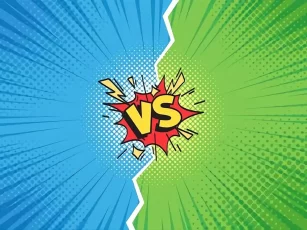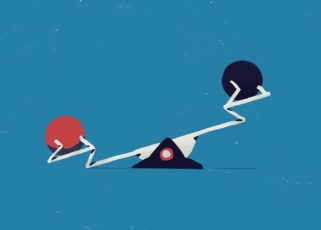Do you know how cool NordVPN is? You should. The web reviews it’s been gathering for months are nothing short of amazing. It’s the VPN enthusiast’s newest darling beloved by Youtubers and security experts alike. And yes, we’re in the NordVPN fan club as well. We love it! As we keep testing many VPNs to find out how they perform in various tasks, NordVPN keeps coming out on top of everybody else. However, is this fair for Avast SecureLine VPN? This vendor is not in the limelight like NordVPN has been for a while, but should it be?
This article will look at Avast VPN and NordVPN side by side to find out which of them is the better option once and for all. We will consider speeds, features, security options, price, and the ability to bypass geo-location-based blocks, especially in video streaming services.
AvastVPN vs NordVPN: The Big Picture
So let’s start by looking at the general panorama of both VPNs. They have a lot in common, which is to be expected. But the different things each VPN offers could be the deciding factor on which is best. So let’s have a look at the big picture. Later in this article, we will discuss each department in further detail.
Common Features
Both VPNs have a zero log policy, which is the one thing you want in a VPN that protects your privacy.
They both support OpenVPN and IPSec VPN tunneling protocols. OpenVPN is the open-source golden standard in VPN protocols, so it’s the least we should expect from a good VPN service.
Netflix and YouTube get unlocked with both VPNs, and they both support Windows, macOS, Android, and iOS.
The customer service department has FAQs, email customer service, and a live chat feature.
And now, let’s see how they’re different.
Differential Features
The NordVPN server network is among the largest in the VPN world (if not the largest one for sure), with more than 5.1k servers in 60 countries. Avast VPN’s network has about 700 nodes in 35 countries, so it’s much smaller.
In the VPN protocol department, NordVPN is ahead of anybody else in the industry. It has adopted WireGuard, the most advanced protocol in the business, and turned it into a proprietary implementation called NordLynx, which is even better than WireGuard’s original software. Furthermore, it corrects some privacy problems with the protocol. In addition, WireGuard (Nordlynx in this case) is the fastest VPN protocol, so it’s a great advantage if you want your VPN to perform at the higher speeds possible.
We already mention that both VPNs will unblock two of the essential video streaming platforms. But NordVPN can unblock many more options like Disney Plus, HBO Max, BBC iPlayer, and Hulu, while Avast can’t.
In the device and operating system department, NordVPN works on Linux systems too, which is essential for the most advanced users. It also has browser extensions for Google Chrome and Mozilla Firefox.
Another difference is the number of simultaneous connections each network admits for any individual account: ten in Avast and six in NordVPN.
Winner: NordVPN is the winner among the two when we look at the bigger picture as a whole. The provider wins this content based on head-to-head security, privacy, speed, server network, streaming & torrenting compatibility, user-friendliness, pricing, and customer support comparison.
Speeds
Before we tell you about the speeds we found on both VPNs, let us tell you a word about speeds on the Internet: they’re messy. We mean that myriad factors can influence or change the speeds you can get from your service, and when you add a VPN to the mix, things only get more complicated.
Things like your ISP’s wiring, the weather, your physical location, your hardware, your router’s configuration, if you’re using WiFi or you’re on Ethernet, and many more things affect the baseline speed you have. Then, as you add a VPN to the system, the additional traffic routing and encryption that happens along the way will cost you a bit of speed too. The idea we want you to understand is: to take our speed results with a grain of salt. No, we did nothing wrong. We were exceedingly careful. But we can’t reproduce your environmental conditions to tell you precisely what you could expect in this aspect.
Each VPN supports several VPN protocols. Some protocols are slower; some are faster. We picked the quickest protocol available in each VPN to compare both services. The most rapid protocol on NordVPN is NordLynx, WireGuard, plus some privacy issue corrections. In Avast, it’s OpenVPN UDP.
The baseline speed for our test was 300 Mbps, symmetric.
So, how much of our speed could we keep once we logged into each VPN? We found 78% and 50% for NordVPN and Avast, respectively, for downloads. And 41% and 9% in upload speeds.
So in the speed department, the losses we found NordVPN to have are hardly noticeable. But Avast’s speeds will give you a different, slower experience, especially if uploading data is essential to your digital lifestyle.
And there’s also an issue with server changes with Avast. Changing a new server takes about ten seconds in the Avast network, while in NordVPN is a seamless process that you can hardly notice.
Video Streaming and Netflix
While increased privacy, anonymity, and security were the initial purposes that brought VPNs online, other use cases for the technology have appeared. For example, after a couple of years of the Covid-19 pandemic, demand for digital entertainment has soared. Thus, a VPN’s capability to unblock video streaming platforms is quickly becoming a VPN’s most demanded feature.
So in our current world context, bypassing geo-blocks is just as important as good encryption if we’re going to find out which is the best VPN. Consequently, we tested both of our contestants’ abilities to deal with geo-location blocks.
Related VPN comparison worth reading: ExpressVPN vs NordVPN: Who Wins?
Avast SecureLine VPN and Video Unblocking
We started with Avast SecureLine VPN for Netflix. This network includes specialized streaming servers, so we did hope for the best. However, after trying servers based in Germany, the UK, and four cities in the US, we had to quit. Avast VPN won’t unlock Netflix for you. We’re sorry to tell you. It’s not that the site reported an error.
But as we saw the Netflix website, we could only access the content it offers at the international level instead of the more extensive catalog we know is available in the US and a few other countries. So this wasn’t about the lack of transfer speeds to support HD video streams. It’s more likely that Netflix already has Avast VPN’s number and is ahead in the eternal war between VPNs and video streamers.
But there is good news too. Avast VPN will unblock the BBC iPlayer and geo-restricted YouTube videos. The first one is good for British TV fans; the second one is the least you expect from any VPN. We could also unblock AMC outside the US with it.
NordVPN and Video Unblocking
NordVPN was a different story. With this VPN, we had no problems unlocking many Netflix regional catalogs, including Canada, the US, and the UK.
Yes, BBC iPlayer and YouTube worked as well. But we also managed to use this VPN on Hulu and DAZN.
So NordVPN is a way better choice if Netflix and other streaming services are on your wishlist.
Using the BitTorrent Network
Both VPN networks are suitable for BitTorrent users, and they have something extra to offer too.
The Avast VPN network includes torrenting-specialized servers, which anonymize all the data you transfer over your favorite P2P network. And nothing else. Don’t get us wrong; it’s already a good thing that you can use torrents on Avast since many vendors in the market either frown upon it or forbid it. But other than the fact that you can use it, there’s no additional perk.
NordVPN also has specialized P2P servers, but it will give you a little more than that. For example, there are Onion over VPN servers in the network for an additional security layer (your speeds will suffer tremendously, though). Also, some NordVPN servers will allow you to set up their SOCK5 proxy in your torrenting client.
The Features Race
It turns out that NordVPN has earned its reputation for excellent reasons. There is no competition between both VPNs when it comes to additional features, and NordVPN comes out on top by a very comfortable margin. Let’s see in detail.
Split Tunneling
Split Tunneling allows you to decide which applications on your device go through the VPN and which ones send their traffic on the open Internet. It’s a valuable feature when you need access to private networks that won’t accept a connection from external servers like those in the VPN network.
Both VPNs support split tunneling. On NordVPN, you can use it over Windows or Android. On Avast, it’s an Android option only. So while both VPNs support this feature, having it available for Windows users is a significant advantage for NordVPN clients.
Specialty Servers
Both VPNs include servers tailored for specific uses. For example, there are torrenting servers on both VPNs. But only Avast’s VPN has servers specialized in video streaming — although we couldn’t manage to have those special servers to unlock Netflix anyway. Our team members could access Pandora radio outside us even by using Avast SecureLine VPN, though.
On the other hand, Onion over VPN servers are available only on NordVPN. These servers combine the Tor network with a VPN tunnel so even the most paranoid and security-aware users can feel safe using them.
Another type of particular server in NordVPN is the Obfuscation server. This one can be a lifesaver. Obfuscation is a strategy in which all your traffic is disguised as if it was HTTPS. Thus any external observer can’t tell you’re using a VPN because it all looks like your standard HTTPS exchange (which is encrypted by default). This feature makes it possible for you to retain the ability to use your VPN when you are in one of the world’s jurisdictions that either forbid or restrict VPNs.
SmartPlay
SmartPlay is only available with NordVPN. This is a feature that the VPN activates automatically when it detects that you’re trying to connect to a geo-restricted streaming service. Thus, SmartPlay significantly increases the probability that you will be able to unlock the video website you want to see.
CyberSec
This one is also exclusive to NordVPN. CyberSec is a piece of software that will block ads and blacklisted websites for you, thus increasing your security online.
The feature is available in every platform and operating system that NordVPN supports.
Remember that avoiding online apps is not about avoiding annoying pop-us only. Many malware, trackers, and other malicious software spread around the web through ads. Having the ability to prevent them increases your digital safety significantly.
Data Breach Checker
If you feed an email address to this feature, it will let you know if any of your accounts or passwords are leaked into the web. It’s available for Avast SecureLine VPN users only. Nord also offers it but to its password manager, NordPass, users only.
Smart Rules
The ability to configure smart rules as you use the VPN is present on both options. But Avast VPN’s implementation of Smart Rules is a lot more flexible than NordVPN’s.
These “smart rules” are a set of “commandments” that your VPN must follow at all times. So, for instance, you can have your VPN automatically turn on whenever you launch your BitTorrent client or visit a particular website.
Security Comparison
Security is supposed to be the killer application associated with VPNs. So expecting a VPN to be secure is not so much to ask — even services that are not at the top of the industry are supposed to deliver in this regard.
Security in a VPN has to do with the encryption algorithm it uses, the tunneling protocols it offers, whether the VPN keeps logs or not (and if there have been any audits to support that claim).
This round is for NordVPN as well. It has more (and better) tunneling protocols. Its no logs policy is more severe, and it has the audits to prove it.
Also, the mobile NordVPN apps are ioXT certified.
Tunneling and Encryption
The industry standard for encryption is AES-256 bit. The AES algorithm is standard in VPNs and military and intelligence organizations the world over, so it’s as solid as it gets. Both NordVPN and Avast VPN will encrypt your traffic using this algorithm, which has no known weaknesses and it remains unbreakable.
Unfortunately, the even ground we find about encryption doesn’t hold when we turn to tunneling protocols.
Let’s start with Avast VPN. It supports OpenVPN UDP and Avast Mimic. The Open VPN protocol is an open-source protocol that’s the standard in its field. Furthermore, its open-source nature has enabled external audits and examinations, so this protocol is constantly tested and updated.
As a result, all the information you’d like to learn about OpenVPN is in the open for everybody to see. Unfortunately, we can’t say the same about Avast Mimic. It’s a brand new protocol developed in-house. So nothing (important) is known about this protocol; it’s passed no audits, tests, or anything else. We don’t like proprietary VPN tunneling protocols because of that.
And then we turn to NordVPN. It offers NordLynx, IKEv2, OpenVPN (UDP and TCP versions). Of course, we covered OpenVPN already, so let’s just say that it’s available on both networks. IKEv2 is a tunneling protocol that can establish very resilient connections. So if you can’t be in a controlled digital environment (for example, you’re in the street on your mobile), IKEv2 will increase your stability.
And last but not least is NordLynx. This is NordVPN’s implementation of WireGuard. WireGuard is the latest, most advanced VPN tunneling protocol. It’s open-source, it’s super-efficient, and it’s the fastest protocol out there. Unfortunately, it’s also bad for privacy because it forces the creation of IP addresses logs in the servers that use it.
NordVPN has found a way to take advantage of all the great features WireGuard has, eliminating at the same time the potential damage it does to user privacy. And that implementation is called NordLynx. So it’s not a proprietary protocol, but it’s not an open-source one either, strictly speaking. Nevertheless, it gives you the best of both worlds.
Kill Switch
Kill switches are not standard VPN features, but if you’re going to pay for one, you better make sure you have it.
So what is a kill switch, we hear you ask? It’s a piece of software on your VPN that keeps an eye on your connection at all times. If and when it realizes that your connection to the secure tunnel is off, it kills all the traffic coming in and out of your computer. Thus it ensures that nothing coming out of your computer or device will hit the open Internet without encryption.
There are kill switches in the apps for Avast VPN and NordVPN. Avast VPN’s switch is system-wide, while NordVPN is more flexible. You can have a total kill switch or apply to a list of selected applications only.
Log Keeping
Log keeping is a vital issue regarding privacy. Remember that privacy is not like security or anonymity in that it is not a technological issue. It’s all about policy. The best anonymizing software in the world will still help your privacy if the server you use keeps extensive, identifiable logs on your activities. So privacy is the one place in VPNs where the human factor is everything. You can trust a VPN with your privacy if and only if it keeps no logs on user activity.
NordVPN’s reputation on privacy is among the best in the business. This is because the company hails from Panama for a start. This country has no data retention laws in which legislation’s individual rights are regarded more highly than the government’s penchant for surveillance.
But besides its location, NordVPN sticks to a rigorous no-logging policy. Its policy clearly says that none of your information is stored or logged. Ever. And they have undergone two external and independent audits that certify that they put their money where their mouth is.
So NordVPN is great for security and privacy; it’s as simple as that. Everything is transparent.
And what about Avast? Well, not as transparent.
Avast is in the Czech Republic, which is doesn’t belong to the intelligence alliances that keep collecting lots of data on every user, which is why its policy privacy seems out of place for a VPN.
The thing with Avast VPN is that it admits to collecting information that no VPN should be collecting. The data in question include:
- Your IP address (except the last four digits)
- The IP address of the VPN you used
- Timestamps
Should that worry you? It depends. It makes no difference if you want a VPN to watch YouTube and TikTok. But if you were hoping to have a VPN in which your anonymity would be guaranteed at all times, then Avast is not the best you can do.
VPN Network Servers
Let’s have a look at the networks of each VPN.
Avast SecureLine VPN has about 700 servers in 35 countries. 4 are in the Americas, 21 in Europe, 7 in Asia, and 3 in Africa and the Middle East.
NordVPN’s network is much more extensive. It includes around 5.100 servers in 60 countries. Seven of those are in the Americas, 36 in Europe, 11 in Asia, and four in Africa and the Middle East.
This round goes to NordVPN. Again.
Pricing
The pricing systems in both VPNs are simple enough, which we liked. Every plan gets you the same service and the same software. The differences are in the prices, which depend, in turn, on the length of the plan you pick.
So NordVPN will charge you 11.95 USD monthly if you pay for a single month. But 4.92 and 3.49 for a month if you choose the yearly or bi-yearly plans.
Avast has no monthly plans. Alas, you have to subscribe for an entire year or two or three. The monthly fee comes to 4.60, 4.20, and 3.75 USD in each case.
So NordVPN’s cheapest plan costs more than Avast’s. However, both companies have a 30-day money-back guarantee.
Avast takes credit or debit cards and Paypal as means of payment. NordVPN also accepts GooglePlay, Amazon Pay, ACH Transfer, UnionPay, and several cryptocurrencies — but no Paypal.
So this round goes to Avast. Or does it? It makes sense for NordVPN to cost more because its service is of higher quality. However, if you hunt around a bit for coupon codes, you could find that there’s a chance to get a NordVPN account even for less money than Avast.
Supported Platforms and User-Friendliness
NordVPN beats Avast SecureLine in compatibility because it has a Linux desktop application, and it supports other devices like Amazon’s Fire TV stick.
It’s excellent that AVast will let you have ten concurrent connections against six in NordVPN. But even that advantage is not enough to give this round to Avast. NordVPN wins again.
Desktop Applications
The desktop Avast software looks and feels precisely like Avast antivirus (colors, fonts, layout). Both macOS and Windows desktop apps are easy to use and a good choice for beginning VPN users. The advanced options or complex customization preferences are not visible on the surface, so everything looks straightforward. However, that same simplicity would disappoint the more advanced users.
The NordVPN equivalents will be pleasing to more users. That is because they keep a friendly feeling around without sacrificing advanced functionality. However, the Linux option is different: it has no GUI, so you need to be comfortable with terminal sessions.
Mobile Apps
Both VPNs offer iOS and Android mobile apps, as you would expect from any serious VPN.
The mobile Avast apps are good enough. They run smoothly, and they’re user-friendly. The Android version is better, though, as it includes more features such as split tunneling.
Avast could win the battle for mobile apps in an average situation, but, unfortunately, NordVPN’s mobile apps are among the best in the industry. They are almost precisely like desktop software; they’re friendly to see and easy to use. In addition, iOS offers dark web monitoring features. The Android version gives you split tunneling, auto-connect, and pausing.
Customer Support
The thing about customer support is that you should never need it in a perfect world. We don’t live in such a world, however. And if you’re going to need help with your VPN at any point, then you should know you can have it quickly and that it will solve your problem. This is more important if you intend to do more advanced things with your VPN or if you’re going to go for the long term with your provider. In other words: customer support doesn’t matter until you need it. Then, it makes all the difference.
So how’s customer support with Avast? Not the best in the industry, to be honest. It has no live chat option (not even those annoying AI-driven automatic agents). But there is a FAQ and a help forum. Alternatively, you can submit a ticket or make a phone call.
NordVPN’s customer service is better. It has an extensive knowledge base, and the live chat is online 24/7, a chatbot, email support. So if you have a problem, NordVPN’s customer support will solve it more quickly for you.
Avast SecureLine VPN vs. NordVPN: The Verdict
We started this article by giving Avast SecureLineVPN a fighting chance against the overwhelming good reputation that NordVPN has earned over the last few years. We don’t regret that because the proof is in the pudding. The pudding, however, says that NordVPN is the superior option in every possible way.
If you are looking for the best possible VPN among these two, NordVPN is the way to go, hands down.
Don’t get us wrong. Avast SecureLine undoubtedly is a good VPN. But NordVPN is the best one in the industry, and no more than a handful of competitors can come close to competing with it head to head. Avast VPN, unfortunately, is not one of them.
FAQs
Yes. You can use NordVPN and Avast Antivirus in tandem without having any problems for the most part. However, Avast’s SecureLine has been known to interfere with NordVPN’s functionality. If you find that’s your case, disable the Web Shield feature, and everything should run smoothly.
Most definitely yes. It’s one of the best VPNs out there. It has everything and more, and it’s priced at a very competitive level. So if you want the best possible VPN you can get, you can’t go wrong with NordVPN.
There is no general answer to this question because it depends on how it fits the tasks you want to complete with your VPN. Avast SecureLine is not an expensive VPN at all, but it’s not a top-notch one either. If what you want is to have a VPN that only does the basic things a VPN should do but that it does them well enough (for instance, keeping you safe in public WiFi hotspots), then Avast is worth the money. However, if you want something that’s at the vanguard and beyond what most VPNs can offer you, NordVPN is a better option. And the difference in price between the two VPNs is not that big if you buy the yearly plans (which is compulsory in Avast, anyway).
You can indeed. Avast VPN has a free version that gives you 500 MB of data monthly. But it’s slow, and the network’s performance is well below the Avast paid service or any other commercial VPN. We always advise our readers to stay away from free VPNs because they lack functionality and can create privacy problems. Avast has a good reputation, so let’s assume that no privacy violations will occur if you opt for the free service. However, it will still be a subpar service, and you will always be better off paying for your VPN.
NordVPN is better than almost every other VPN on the Internet, and Avast is no exception. It’s better in speeds, performance, unblocking ability, protection, privacy, and everything else. This is not to say that Avast is a bad VPN. On the contrary, it’s a satisfactory service, but NordVPN is the industry’s top, and it shows when you compare both networks side by side.





